|
Supplement
Origins of NATO

Soviet poster from 1950. The writing on the scroll wrapped around the
gun reads "North Atlantic Pact" and at the bottom is a quote from
Stalin: "The peoples of the world do not want a
repetition of the misery of war."
• Conditions
at
the
Time
of
NATO's
Founding
• Stalin on
Preserving the Peace and Dangers from
Imperialism 1945-1952
• The
Post-War Foreign Policy of the USA
- USSR Ministry of
Foreign
Affairs, January 29,
1949 -
Origins of NATO
Conditions at the Time of NATO's Founding
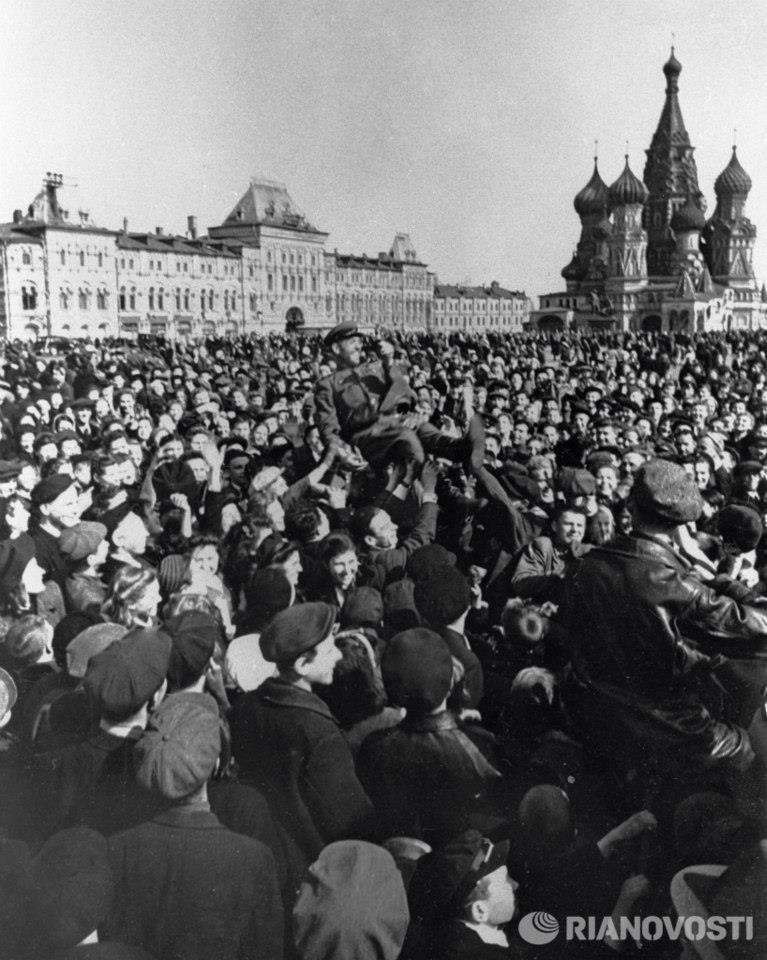 
Mass celebrations of VE
Day, 1945, in Red Square, Moscow (left) and Times
Square, New York City, profound expressions of the people's relief and
joy at the end of World War II.
The period that immediately followed the end of World
War
II, at a time the whole world was celebrating the defeat, through
so much sacrifice, of Nazi Germany, fascist Italy and militarist
Japan, was imbued with the forward march of humanity which had
hoisted the banner of peace, freedom and democracy.
The need of the time was to carry out all the decisions
which had been taken by the Allied powers at the Yalta and Potsdam
Conferences in 1945 to carry out the "four Ds": denazification of
Germany; demilitarization of the former Nazi Wehrmacht (armed forces);
democratization, including the formation of political parties and trade
unions, freedom of speech, of the press and religion; and
decentralization of the German state into a federal system, that
included establishing a new basis for Germany's economy, as well as
other post-war tasks in Europe which presented themselves
at that time.
The need to preserve the peace and interdict the dangers
posed by imperialism was astutely grasped by the leader of the Soviet
victory over Nazi Germany, Joseph Stalin. J.V. Stalin was General
Secretary of the Communist Party of the Soviet Union (CPSU), and then
Chairman of the Council of Ministers from 1941 when he led the Soviet
Union, Red Army and partisans in achieving that victory. He summed up
the experience and repeatedly emphasized the need to implement the
agreements for the post war arrangements so as to preserve the peace.
As he assessed the situation he warned the peoples of the Soviet Union
and people's democracies and the entire world of the threats to peace
as a result of the betrayal of those agreements on the part of the
Anglo-American imperialists.
This supplement of TML
Weekly publishes for the information of our readers an article
on what Stalin had to say on the urgency of realizing the aspirations
of the peoples of the world -- who had sacrificed so much to defeat
Nazi-fascism and Japanese militarism -- for peace, freedom and
democracy. The second item is the statement of the Ministry of Foreign
Affairs of the USSR in response to the drafting of the North Atlantic
Pact that would lead to the creation of the North Atlantic Treaty
Organization (NATO) on April 4, 1949.
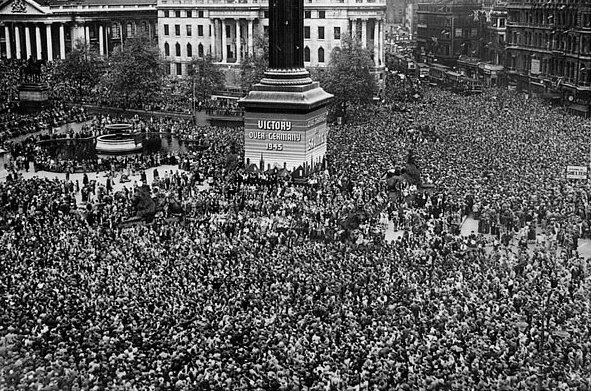 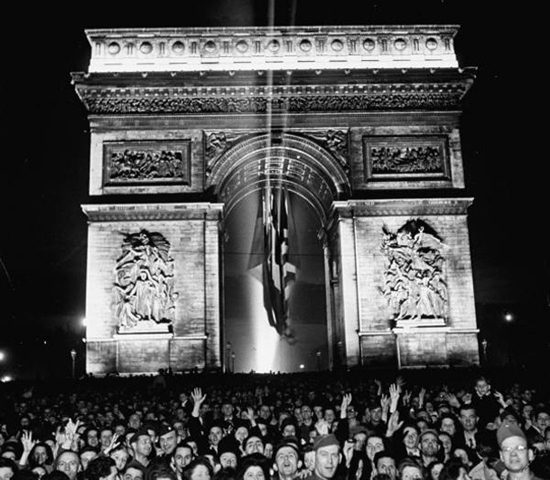
VE Day celebrations, 1945, in Trafalgar
Square,
London (left); and at the Arc de Triomphe,
Paris.
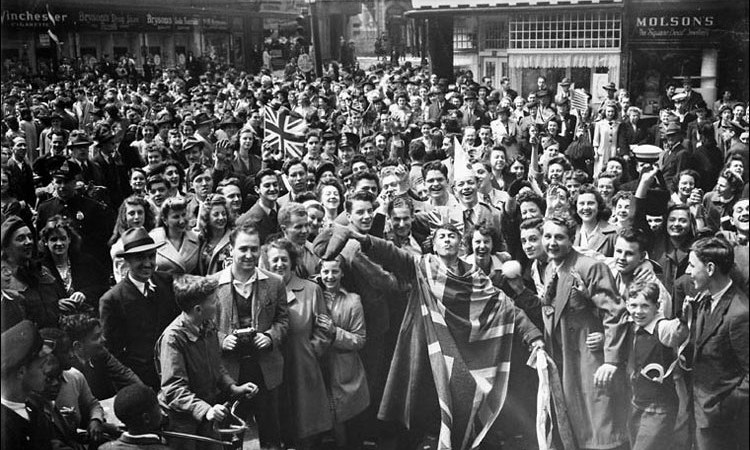 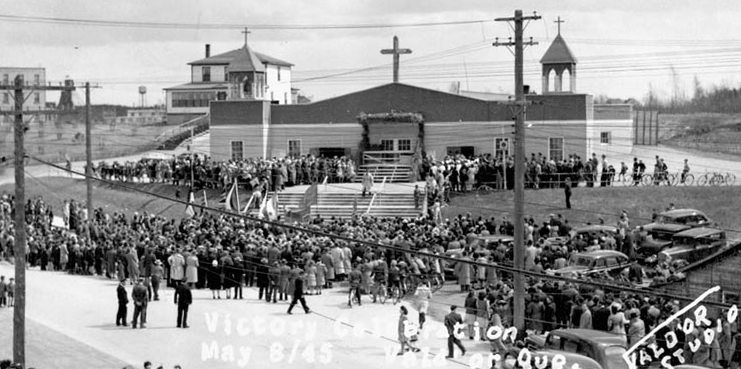
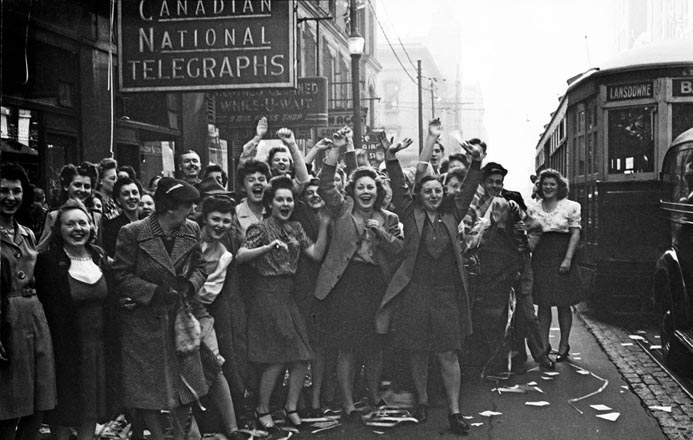 
Celebrations of VE Day,
1945, Montreal (top left); and Val d'Or (top right);
Toronto (bottom
right) and Ottawa.

Stalin on
Preserving the Peace and Dangers from Imperialism 1945-1952
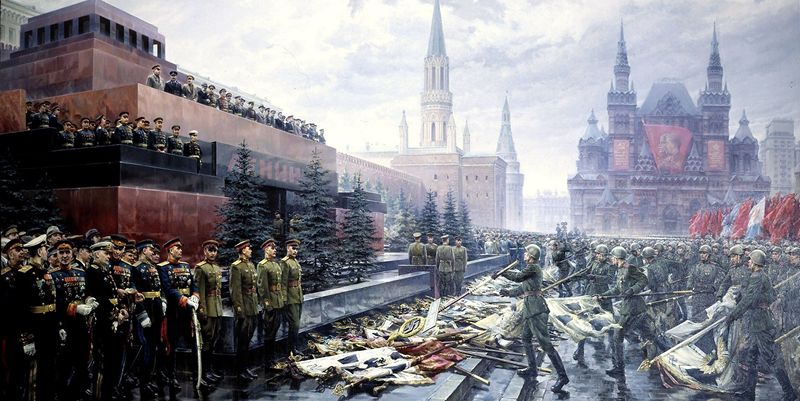
Soviet Red Army soldiers throw down Nazi insignia at Victory Parade,
Moscow, June 24, 1945.
On May 9, 1945, Stalin hailed the victory over
Hitlerite fascism in a broadcast to the Soviet people.
Henceforth, he said, the great banner of the peoples and peace
among peoples will fly over Europe.[1]
In September in a further address, he stated
that "now we can say that the conditions for peace all over the
world have been gained."[2]
Early in the following year he spoke several times of
the
origins and character of the Second World War. He explained that
the capitalist system of world economy harbours within itself
elements of general crises and armed conflicts. The result is a
splitting of the capitalist world into two hostile camps and war
between them. The Second World War had been prepared by
international reaction and started by the main fascist powers.
They had declared for all to hear that they were out for world
domination and the establishment of a fascist regime throughout
the world. They had showed that they were prepared to carry out
their threat of enslaving all the freedom-loving nations. Thus,
unlike the First World War, the Second World War against the Axis
states from the very outset assumed the character of an
anti-fascist war, a war of liberation, one aim of which was also
the restoration of democratic liberties. The entry of the Soviet
Union into the war against the Axis states could only enhance, he
argued, and indeed did enhance, the anti-fascist and liberation
character of the Second World War.[3]
In his May 1 address in 1946, Stalin pointed out that
the
smashing of fascism had led to a profound growth of the
democratic movement of the people. People who want to change
their lives take the fate of their state into their own hands, he
said, and erect a democratic order and lead a struggle against
the reactionary powers, against what he termed "the arsonists of
a new war." The Soviet Union, he declared, was in the vanguard of
this movement. It would continue its politics of peace and
security, equality and friendship of the peoples. At the same time, he
warned, the armed forces of the Soviet Union must be on guard, to
protect the peace.[4]
First among these "arsonists," he maintained, was
Winston
Churchill. In March 1946 at Fulton, Missouri, Churchill had given
his infamous Iron Curtain speech. Several days later, Stalin, in
an interview with Pravda, stated that Churchill's speech
had unquestionably prejudiced the cause of peace and security. He
had taken the stand of the warmongers, and was not alone. He was
calling for war on the Soviet Union. Stalin likened Churchill to
Hitler and his friends, in setting out to unleash a war with a
race theory, in Churchill's case calling upon the
English-speaking peoples to decide and rule over the destiny of
the world. He denounced Churchill's disregard of solemn
Anglo-Soviet treaties. He ridiculed Churchill's talk of the
Soviet Union's "expansionist tendencies" and the subservience of
the People's Democracies, while pointing out his support for
former Nazi collaborators. He said that Churchill's correct
observation of the growing influence of the Communists in Europe
was a logical result of their fearless and self-sacrificing fight
against the fascist regimes. He ridiculed too Churchill's
patronizing reference to "plain people from little homes,"
pointing out that these plain people in Britain had just swept
Churchill out of office! He ended by asserting that should
Churchill succeed in launching war against the Soviet Union --
not probable because millions of "plain people" stood guard over
the cause of peace -- he would be thrashed as surely as he was
when he led the intervention of 14 states against Russia in
1919-20.[5]
Later that month, questioned by an Associated Press
correspondent about safeguarding world peace, Stalin replied that
he attached great importance to the UN as a serious instrument
for maintaining peace and international security. He did not
believe nations or armies sought a new war, but that certain
political groups engaged in propaganda for a new war in order to
sow seeds of dissension and uncertainty. He went on to say that
the public and ruling circles in the freedom-loving countries
should organize widespread counter-propaganda against the
propagandists of a new war, that not a single utterance should go
without rebuff.[6]
Stalin
expanded on this theme later in 1946 in an interview with a Sunday
Times correspondent. He said that he did not
believe that there was a danger of a new war. The clamour about
it was aimed to scare naive opponents and win concessions from
them, to obstruct reductions in arms production, and to hinder
troop demobilization to prevent alat rapid growth in unemployment.
When asked about "capitalist encirclement" of the Soviet Union,
he said this could not be done, even if desired. He called for a
demilitarized and democratized Germany, as one of the most
important guarantees of stability and lasting peace. He said that
friendly and lasting co-operation between the Soviet Union and
the Western democracies was possible. Asked about the U.S. atom
bomb monopoly as a danger to peace, Stalin replied that he did
not think it such a force. It was intended to intimidate the
weak. It could not decide the outcome of any war. It was
certainly a threat but the U.S. monopoly would not last long, and
its use would be prohibited.[7]
Towards the end of 1948, Stalin said that the policies
of the
leaders of the USA and Britain were policies of aggression, of
unleashing a new war. Asked in an interview with Pravda on
October 28, 1948 about the USA and Britain declaring null and
void agreements already reached regarding Berlin, Stalin
explained that they did not want agreement and co-operation, but
rather to show that co-operation with the Soviet Union was
impossible and to show the necessity of a new war, and thus to
prepare the ground for the unleashing of war. The policy of the
present leaders of the USA and Britain, he said, was a policy of
aggression, a policy of unleashing a new war.
Asked how this would all end, Stalin replied that it
could
only end in ignominious failure on the part of the instigators of
a new war. Churchill, he said, the main instigator of a new war,
had already managed to deprive himself of the trust of his own
nation and of democratic forces throughout the world. The same
fate lay in store for all other instigators of war. The horrors
of the recent war were still fresh in the memory of the peoples;
and public forces favouring peace were too strong for Churchill's
pupils in aggression to overpower them and to turn them towards a
new war.[8]
On February 17, 1951, again in an interview with Pravda,
Stalin
refuted
as
a
slander
British
Prime
Minister
Clement
Attlee's
claim
in
the
House
of Commons that the Soviet
Union was not demobilizing its forces but increasing them. He
pointed out that no state could develop its war industry while,
as was the Soviet Union, reconstructing its economy demolished by
German occupation, expanding that economy and reducing prices,
and developing huge hydropower works, without risking bankruptcy.
Attlee's government, he said, was justifying carrying on its own
arms race, misleading the British people, blindfolding them with
lies about the Soviet Union, dragging them towards a new world
war that would be organized by the warmongering circles in the
USA. If Attlee were for peace, he asked, why was he against the
proposals of the Soviet Union to limit armaments and immediately
forbid atomic weapons? Why had he forbidden the holding of the
Second World Peace Congress in Britain?[9]
Could the campaign for the
defence of peace
possibly threaten the security of Britain? Stalin concluded that
it was clear that Prime Minister Attlee was not for keeping the
peace, but for unleashing a new world-encompassing war of
aggression.
Asked in the same interview about the Korean War, then
into
its second year, Stalin said that if Britain and the USA declined
the proposals of the People's Republic of China for peace, the
war in Korea could only end in defeat for the interventionists.
He explained that while the soldiers had considered the war
against Hitler and Japan just, it was difficult to convince them
that Korea and China were not right to defend their security on
their own territory or on the borders of their state. That is why
the war was unpopular among the American and British soldiers,
why they did not believe in the justice of their mission, or feel
enthusiasm.
As to the UN declaring China the aggressor, this was
scandalous, he said. The UN, Stalin argued, which was created as
a bulwark for keeping peace, had been transformed into an
instrument of war, a means to unleash a new world war.[10]
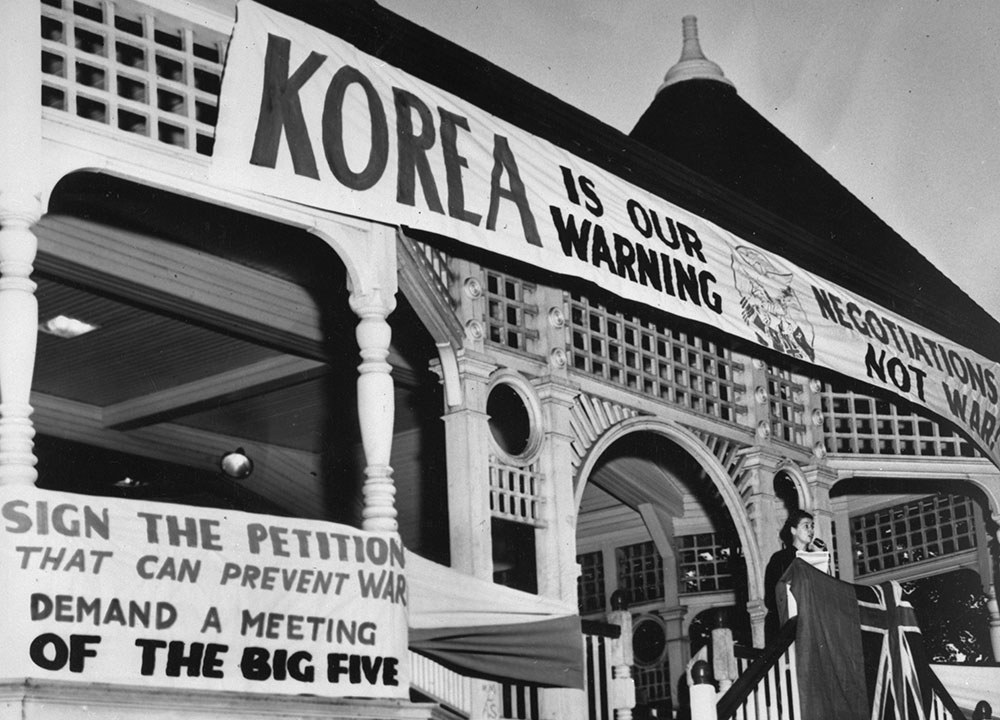 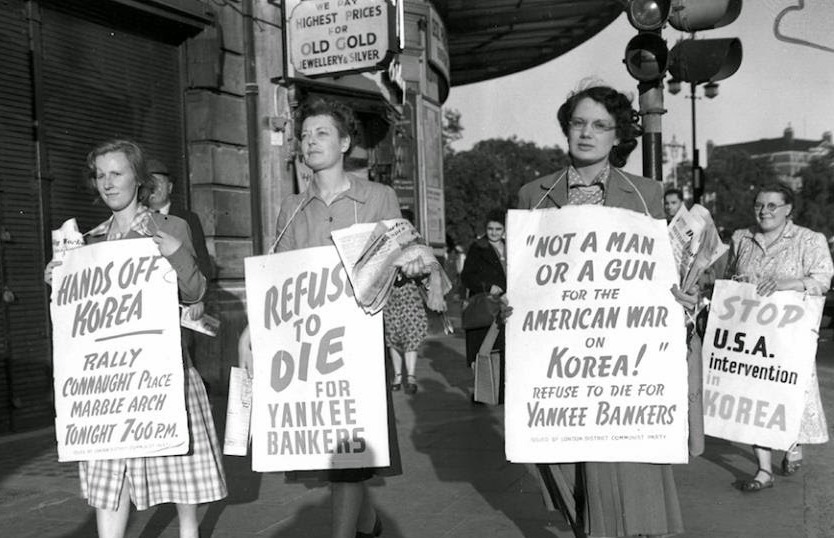
Anti-war actions in Canada (left) and the U.S. express the ongoing
anti-war sentiment of working people after World War II, and the
rejection of imperialist propaganda for new wars.
Asked if he considered a new world war unavoidable,
Stalin
replied that he did not consider war unavoidable. He explained
that in the USA, in Britain, and also in France, there were
aggressive powers that longed for a new war. They needed war to
achieve super-profits and to plunder other countries. These
aggressive powers held reactionary governments in their hands and
guided them. At the same time they were afraid of their people
who did not want a new war and were for keeping the peace.
Therefore they used the reactionary governments to ensnare their
people with lies, to represent a new war as a war of defence, and
the peaceful politics of peace-loving countries as aggressive.
They feared the campaign for the defence of peace. They feared
the proposals of the Soviet Union on the conclusion of a peace
treaty, on the limitation of armaments and on the forbidding of
atomic weapons.
Peace will be kept and strengthened, Stalin said, if
the
people take the upholding of peace in their own hands and defend
it to the utmost. War could be unavoidable if the arsonists of
war succeed in trapping the masses with their lies, in deceiving
them and drawing them into a new war. Therefore a broad campaign
for the upholding of peace, as a way of exposing the criminal
machinations of the arsonists of war, is of prime importance. The
Soviet Union, he said, would continue to carry through the
politics of preventing war and keeping peace.[11]
Later
that
year,
on
October
6,
1951,
Stalin spoke on the issue of atomic
weapons in a further interview with Pravda. He asserted that there were
no grounds for alarm regarding the Soviet Union's atomic bomb test. He
explained that the Soviet Union not only opposed the employment of
atomic weapons, but also stood for their prohibition and the
termination of their production. The Soviet Union had several times
demanded prohibition of atomic weapons, but each time this had been
refused by the Atlantic bloc powers. Therefore, in the event of an
attack by the USA on his country, he said, the ruling circles of the
USA would use the atom bomb. This had compelled the Soviet Union to
have the atomic weapon in order to meet the aggressor fully prepared.
Thus, he argued, if the USA had no intention of attacking the Soviet
Union, the alarm was false, as the Soviet Union did not contemplate
ever attacking the USA or any other country.
Stalin
went
on
to
say
that
the
Soviet Union stood for international control of
atomic weapons. He explained that U.S. personages also spoke of
control, but presupposing not termination but continuation of
production relative to the amounts of raw material at the disposal of
different countries. This was not control but a mockery of control, he
said. This could not satisfy the demands of the peace-loving peoples.[12]
That same month, significantly, Stalin sent a telegram
to Kim
Il Sung, President of the Democratic People's Republic of Korea,
wishing the brave Korean people success in their heroic struggle
for the freedom and independence of their homeland.[13]
The following year, on March 31, 1952, in answers to
U.S.
newspaper editors, Stalin said he did not consider a Third World
War likely in the coming years, that he thought a meeting of the
Great Powers would possibly be useful, that the time was ripe for
German reunification, and that capitalism and communism could
live side by side if both sides co-operated, and had the
readiness to do so, if both fulfilled their international duties,
and if the basis was equality and non-interference in the affairs
of other states.[14]
On October 14, 1952, in his Speech to the 19th Congress
of
the CPSU, Stalin spoke of the struggle for a better future for
the people, the struggle against war, the struggle to keep peace.
He expressed thanks for the support of the fraternal parties. He
noted the special quality of that support of the peace endeavours
of his Party by each fraternal party simultaneously signified the
support of their own people in their struggle to keep peace. His
Party must do its duty by its fraternal parties and support them
and their peoples in the struggle for liberation and in their
struggle for keeping peace.
Stalin ended his speech with his famous call concerning
national independence and national sovereignty. Earlier, he said,
the bourgeoisie, as the heads of nations, were for the rights and
independence of nations and put that "above all." Now there was
no trace left of this "national principle." Now the bourgeoisie
sell the rights and independence of their nations for dollars.
The banner of national independence and national sovereignty had
been thrown overboard. Without doubt, he said, you the
representatives of the communist and democratic parties must
raise this banner and carry it forward if you want to be patriots
of your countries, if you want to be the leading powers of the
nations. There is nobody else to raise it.[15]
Most significantly, Stalin finished with these slogans:
Long Live the Peace Between the Peoples!
Down with
the Arsonists of War!
Notes
1. Victory Speech:
broadcast from Moscow, May 9, 1945. Works, Volume 16.
2. Stalin's Address to the
People, September 2, 1945. Works, Volume 16.
3. Origin and Character of the
Second World War,
February 9,
1946, from a speech to the voters of his district during the
election to the Supreme Soviet. For Peaceful Coexistence:
Post-War Interviews (International Publishers: New York,
1951).
4. Order of the Day of the
Minister of the Armed Forces
of
the USSR, No 7, May 1, 1946. Works, Volume 16.
5. Interview with Pravda
Correspondent
Concerning Mr
Winston Churchill's Speech at Fulton, March 1946. J.V. Stalin on
Post-War International Relations, Soviet News, 1947.
6. Replies to Questions put by
Mr Eddie Gilmore,
Associated
Press Correspondent, March 22, 1946. J.V. Stalin on Post-War
International Relations.
7. Replies to Questions put by
Mr Alexander Werth,
Moscow
Correspondent of the Sunday Times,
September
24,
1946.
J.V.
Stalin
on
Post-War
International
Relations.
8. For Peaceful Coexistence, op.
cit.
9. The Second World Peace
Congress had been scheduled
for
Sheffield, England in 1950, but British authorities sought to
undermine it on an anti-communist basis. They refused visas to
many delegates, with Prime Minister Attlee denouncing the
congress as a "bogus forum of peace with the real aim of
sabotaging national defence" and saying that there would be a
"reasonable limit" on foreign delegates. In light of this, the
congress was moved to Warsaw.
10. The UN flag was criminally
co-opted by the U.S. to
give
a veneer of legitimacy to the Korean War. In
reality, it was a police action led by the U.S. that involved 15
other countries, including Canada, in this unjust anti-communist
aggression. A UN Security Council Resolution supporting military
aggression was illegitimately passed when the Soviet Union was
absent from the council, due to a boycott in support of the
People's Republic of China's inclusion in the Security Council,
rather than the Republic of China which had been defeated in the
Chinese Civil War. The People's Republic of China later sent
780,000 troops of its People's Volunteer Army to bolster the
forces of the Democratic People's Republic of Korea.
11. Interview with a Pravda
Correspondent,
February
17, 1951. Works, Volume 16.
12. Prohibition of Atomic
Weapons, October 6, 1951.
Interview
with Pravda Correspondent. For
Peaceful
Coexistence, see
above.
13. Answering Telegram to
Chairman of Council of
Ministers of
DPRK, October 20, 1951.
14. Answers to Four Questions
from a Group of Editors
of
American Newspapers, March 31, 1952. Works, Volume 16.
15. Speech to the 19th Party
Congress of the CPSU,
October
14, 1952. Works, Volume 16.

The Post-War Foreign Policy of the USA
- USSR Ministry of Foreign
Affairs, January 29, 1949 -
On January 14 the United States State Department
published a
verbose statement under the imposing title: "We Build the Peace.
Collective Security in the North Atlantic."
This official document sets forth the position of the
USA
on the question of the so-called "North Atlantic Pact,"
negotiations for which have been carried on since the Summer of
last year by the USA and Canada jointly with the Governments
of Great Britain, France, Belgium, Holland and Luxembourg.
Whereas the ruling circles of these five West European
states, with patronage on the part of the USA, formed a
military-political alliance last year under pretext of collective
self-defense; this year there is being realized the far-reaching
Anglo-American plan of forming a "North Atlantic alliance" with
participation of those same European countries and Canada,
directly headed by the United States of America.
In his speech January 20 President Truman declared that
the
draft North Atlantic Pact, the official aims of which were
declared to be a desire to strengthen security in the North
Atlantic, will soon be sent to the Senate.
I. The Western Union -- An Instrument of the Aggressive
Anglo-American Bloc in Europe
In March, 1948, a treaty of
mutual aid and collective defense was signed in Brussels between
Great Britain, France, Belgium, Holland and Luxembourg. This
inaugurated the formation of a separate grouping of certain West
European states known as the "Western Union." The view is
entertained that certain other European countries, ready to
adjust their policy to the aims of this grouping headed by Great
Britain, will also be included in the Western Union. At the same
time it is known that from the very outset those who instituted
the Western Union excluded the possibility of the participation
of the Soviet Union and all the countries of people's democracy
in this union, thereby demonstrating that the Western Union was
formed not for the purpose of uniting the peace-loving European
countries and in general not in the interests of ensuring lasting
peace in Europe, but for other purposes which have nothing in
common with the interests of strengthening peace and
international security.
It is not accidental that statesmen of the countries
participating in this grouping, beginning with British Minister
Bevin, were obliged to declare openly that the formation of the
Western Union signified an important change in the policy of
these countries. It was no longer possible to conceal this when
the behind-the-scenes work of preparing this grouping was
terminated. It is not hard to discern that formation of this
union signifies that the Governments of Great Britain, France and
the other participating countries have conclusively broken with
the policy followed by the democratic states composing the
anti-Hitler coalition during the second world war, whose aim was
to rally the forces of all the peace-loving states in order to
put an end to Hitlerite aggression and fascism and not to allow
revival of the aggressive forces after the end of the war.
The formation of the Western Union signifies, first of
all, a
complete change of the policy of Great Britain and France on the
German question, and demonstrates the abandonment by the governments of
these countries of the democratic and
anti-aggression policy toward Germany which was adopted by the
Yalta and Potsdam conferences of the powers of the anti-Hitler
coalition.
During the second world war the allies in the
anti-Hitler
coalition were united not only by the desire to carry to a
victorious conclusion the war of liberation against Hitlerite
Germany and fascism. They were also united by the desire in the
future not to permit German aggression, which has unleashed two
world wars in the course of recent decades. These noble desires
found expression in the decisions of the Yalta and Potsdam
conferences.
The 20-year treaties of friendship and mutual aid
signed by
the Soviet Union with Britain in 1942 and France in 1944 were
expressions of this policy aimed at not permitting resurgence of
an aggressive Germany. It is perfectly evident that the policy
which found expression in these and other such treaties accords
not only with the interests of the countries signatory to these
treaties but also with the interests of all the peace-loving
peoples of Europe.
The Soviet Union continues to stand firmly on the
ground of
this policy, which fully corresponds to the decisions of the
Yalta and Potsdam conferences of the heads of the Governments of
the USSR, USA and Great Britain, and of France, which
associated herself with these decisions, and which is aimed at
securing lasting peace in Europe and preventing fresh aggression
on the part of the state which was the chief culprit in the
unleashing of the two world wars.
The formation of the Western Union signifies that Great
Britain and France have abandoned the implementation of this
anti-aggression policy adopted at the Yalta and Potsdam
conferences and that these powers have passed over to a new
policy very dangerous for the peace-loving peoples which pursues
the aim of establishing their hegemony over the other peoples of
Europe, even to the point of employing for these purposes
yesterday's aggressor, which since the war has fallen into a
position of dependence upon them. Only in this way can the fact
be explained that although the text of the Brussels pact refers inter
alia to a desire not to permit a renewed
policy of
aggression on the part of Germany, the Governments of Great Britain
and France, together with the Government of the USA, are
striving at the present time to involve and use for their
purposes Western Germany where, with the assistance, in the first
instance, of the Anglo-American occupation authorities, the old
pro-Hitler and militarist elements of German reaction have
increasingly come to strengthen themselves in all parts of the
administration. The fact that this change in the policy of the
West European states has found support and encouragement on the
part of the U.S. ruling circles considerably increases the
danger in the political changes which have occurred in these
European countries, which have made a break with the peace-loving
policy and have embarked on the path of preparing for new
aggression in Europe.
In contrast with all the treaties of mutual aid
concluded by
the Soviet Union with the other European states, including France
and Britain, which are aimed at preventing the possibility of new
aggression on the part of Germany and fostering a
strengthening of peace in Europe, the military alliance of the
five Western states has in view not so much Germany as the
possibility of employing the grouping of Western powers formed by
them against those states which were allied with them during the
second world war. The speeches of a number of statesmen of the
Western countries and also articles in the Anglo-American and
French press openly make aggressive statements to the effect that
the Western Union was formed against the USSR and the states
of people's democracy, although the peace-loving character of the
policy of the latter countries is an incontestable and well-known
fact. Given this situation it cannot be denied that no matter how
much the real aims of the Brussels treaty may be glossed over,
the formation of the Western Union has nothing in common with
these states' interest in self-defense.
On the other hand, it has already been made
sufficiently
clear that it is intended, under the pretext of not permitting a
situation to arise which could jeopardize the so-called "economic
stability" of the members of this pact, to take military measures
and all sorts of repressions against the working class and the
growing democratic forces within these states and also against
the mounting liberation movement of the peoples in the colonies
and dependent countries. It is not accidental that the Brussels
pact is an alliance of colonial powers which for the sake of
preserving their age old privileges in the colonies are striving
to employ the new formed military-political grouping for the
purpose of repressing the national-liberation movements in these
colonies. All this merely underscores the anti-democratic and
reactionary-aggressive character of the Western Union.
The alliance of the five West European states is a
military-political supplement to that economic association of
European states which was formed to carry out the "Marshall Plan"
in Europe. Both these groupings of European countries receive
their orientation from the ruling circles of the Anglo-American
bloc, which is by no means interested in realizing the genuine
national-state or, at any rate, economic aims of the countries
belonging to these groupings, but pursues the aims of
strengthening and further expanding its own military-strategic
and economic positions.
Implementation of the Marshall Plan is not directed at
the
real economic recovery of the European states, but is a means of
adapting the policy and economic life of the "Marshallized"
countries to the narrowly selfish and military-strategic plans of
Anglo-American hegemony in Europe. In the same way, formation of
the new grouping was undertaken by no means for the purposes of
mutual aid and collective defense of the participants in the
Western Union, since, if the Yalta and Potsdam agreements are
carried out no aggression threatens these countries; but the new
grouping pursues the aims of the strengthening and further
expansion of the ruling influence of the Anglo-American ruling
circles in Europe, with subordination to their narrow aims of the
entire foreign and domestic policies of the corresponding
European states. The incompatibility of these political plans of
the Anglo-American bloc with the interests of peace and with the
implementation of the principles of democracy in the European
countries is perfectly evident.
As soon as the Western Union was born in March of last
year,
it was immediately stated on the part of the U. S. ruling circles
that full support would be given to this union.
Such a statement was quite natural, since these circles
have
every ground for supposing that the new grouping will not get
away from them and will be in complete dependence upon any kind
of Anglo-American plans. In any case special American observers,
whose role is understandable, were nevertheless assigned to the
Western Union. It is now apparent that the farther and more
rapidly the countries of the Western Union travel along the path
of being opposed to the countries of people's democracy and the
Soviet Union, to which the policy of the Anglo-American bloc
impels them in every way, the more the Western European states
will fall into political and economic dependence upon the ruling
circles of the USA, who have no concern at all for the
political independence and economic recovery of the European
states.
The result of this situation will be an inevitable
aggravation, already manifesting itself at every step, of the
contradictions both between the USA and the countries of the
Western bloc and within the West European grouping itself. The
new West European grouping, which has a kind of auxiliary
significance if the broader European grouping composed of the
"Marshallized" countries is borne in mind, was not formed on a
healthy and firm basis of economic recovery. It not only is not
rendering any substantial practical assistance to the countries
participating in the new grouping but, as is known, has in no way
prevented the rise of ever-mounting economic difficulties in a
whole series of West European states, has also failed to prevent
a tremendous growth of unemployment in certain of them, and has
not helped to open up any encouraging prospects for their further
economic development. The aggressive aims of this grouping also
are expressed in ever more new demands to increase armies and
military budgets, which still further undermines the possibility
of their further and stable economic progress. At the same time
this situation causes a constant growth of serious political
difficulties inside these states. And this at a time when the
Soviet Union and the countries of people's democracy, which are
taking only the first steps in their socialist development, are
marching along the path of swift and unswerving economic recovery
and advancement and, at the same time, along the path of
strengthening the democratic foundations and political unity of
the peoples liberated from reactionary oppressor regimes.
The Western Union has already undertaken no few
measures for
its organizational set-up. Not only the Consultative Council but
also the permanent organ of the union, consisting of
representatives of the five states, were formed in London last
Spring. Also formed was the Military Committee and furthermore
the Defense Staff of the Western Union, composed of the chiefs of
staff of the five states, headed by British Field Marshal
Montgomery, although those who instituted the Western Union were
unable to point to the existence of any danger of aggression
against their states.
The haste in implementation of all these organizational
measures, including the formation of the Military Staff under
peace-time conditions, by no means attests that the participants
in the new grouping are imbued with a desire to ensure lasting
peace in Europe. The bustling to carry out these measures rather
attests to the fact that they pursue the aim of bringing
political pressure upon certain European countries, including the
Western part of Germany, in order to accelerate the attraction of
these countries to participation in the Western grouping with the
aid of loud advertisement of all these measures and, at the same
time, to further an intensification of the alarm, uncertainty and
war hysteria in public circles of the European states, which is
at the present time one of the chief tactical tasks in the
development of the aggressive policy of the Anglo-American bloc
in Europe.
Together with the formation of this new grouping in
Europe,
the ruling circles of the USA and Great Britain have been
making preparations in recent months for the formation of a North
Atlantic Alliance composed of the same five Western European
states, Canada and the United States of America. The aims of the
North Atlantic Alliance are considerably broader than the aims of
the West European grouping, and moreover it is not hard to
discern that these aims are most closely linked with plans for
the forcible establishment of Anglo-American world hegemony
under the aegis of the United States of America.
II. The North Atlantic Pact and the Anglo-American
Plans
of World Hegemony
The formation of the Western Union
answers the aims of the Anglo-American bloc in Europe and it is
already clear at the present time that the West European grouping
is only one and moreover not the main element in the system of
measures envisaged by the plans for establishing Anglo-American
world hegemony. Granting Great Britain the principal position in
the Western Union, the ruling circles of the USA have every
opportunity to exercise the influence which they need upon the
policy of the whole West European grouping.
It should also not be forgotten that the treaty
concluded in
Rio de Janeiro among the states of North and South America, which
ensures the ruling circles of the USA the influence which they
need with respect to the overwhelming majority of these states,
came into force at the end of last year.
In the above-mentioned document the State Department
regards
the realization of the Western Union in Europe and the coming
into force of inter-American pact as important conditions
preparing the ground for implementation of U.S. policy on a
world scale. Moreover, it advances as the principal element in
the implementation of this policy the North Atlantic Pact, which
is to have as its support the already formed groupings of
countries in Europe and America; the ruling circles of the USA
furthermore have from the very outset taken the realization of
all this into their own hands.
In its document "Collective Security in the North
Atlantic,
the U. S. State Department endeavors to represent the North
Atlantic Pact which it is preparing as a regional security
agreement among the countries of the North Atlantic, glossing
over the real character and true import of this pact. The
groundlessness of this explanation of the necessity for such a
pact is evident from the single fact that, as everyone knows, no
aggression threatens the countries of the North Atlantic.
In order to mask still further the real character and
true
aims of the North Atlantic Pact, the State Department had to
resort to stupid fictions about the "obstructionist policy" of
the Soviet Union in the United Nations and to deliberately
nebulous statements about the necessity of "meeting a potential
aggressor with overwhelming force," allegedly the obligation of a
special grouping of countries headed by the USA which cannot
await the time when the United Nations will be sufficiently
strong.
The State Department was unable to conceal the hostile
character of the North Atlantic Pact with respect to the Soviet
Union and the countries of people's democracy, restricting
itself, however, to all sorts of dark hints about "a potential
aggressor." But on the other hand the State Department did not
venture to refer bluntly to the anti-Soviet aims of the new
treaty which it is preparing, since dissemination of slander
about the aggressiveness of the policy of the Soviet Union reacts
more and more in international public circles against those who
resort to such dishonest means of political struggle.
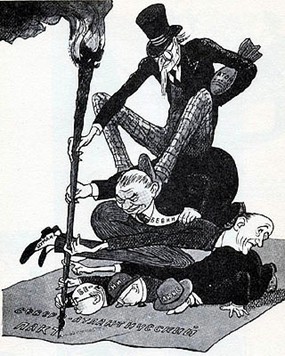
Soviet cartoon on U.S. dominant position in
signing of North Atlantic
Pact.
|
The North Atlantic treaty project and the circumstances
accompanying its preparation plainly disclose the desire of the
Anglo-American bloc for world hegemony.
Although the North Atlantic Pact envisage participation
of
the five European countries, Canada and the USA as its
nucleus, it is clear to all that leadership in this affair
belongs to the ruling circles of the United States of America,
who are en bloc with the ruling circles of Britain, as the
most powerful capitalist power in Europe. Given this situation,
the North Atlantic Pact is in fact being converted into the
principal instrument of the aggressive policy of the ruling
circles of the USA and Britain "on both sides of the
Atlantic," i.e., in both hemispheres, and thereby accords with
the aggressive desires for establishment of Anglo-American world
hegemony, which, as is known, was proclaimed as the main post-war
task of the USA and Great Britain in Churchill's
sensation-creating Fulton speech at the extraordinary meeting
which took place under the chairmanship of President Truman.
Apart from the United States, Canada and the five West
European states, which include such a "North Atlantic" state as
Luxembourg, the projected North Atlantic treaty allows for the
inclusion of certain other states as members. There is no little
gossip abroad now in this connection.
There is talk of attracting such countries as Sweden,
Norway
and Denmark to participation in this treaty, with note being
taken moreover of the peculiar activeness of the Government of
Norway in this affair. Certain persons recommend that the
difficulties existing on this score be circumvented by a special
Scandinavian pact which, according to these plans, should not
prevent incorporation of the Scandinavian countries in the orbit
of the states factually under the leadership of the "North
Atlantic" grouping.
It is stated that discussions are in progress
concerning the
possibility of participation in the North Atlantic Pact by Franco
Spain, Portugal, Italy and even Turkey; evidently it is
considered that fulfillment of the tasks of the ruling grouping
of the so-called "North Atlantic" can be furthered in this way
too. Along with this there is discussion of a plan of forming a
Mediterranean alliance or an East Mediterranean pact as one of
the auxiliary instruments of the "North Atlantic" grouping.
These plans of forming more and more new separate
groupings
of states under the aegis of the USA and Great Britain merely
underscore the fact that the aims of the basic imperialistic
grouping now being assembled on the basis of the North Atlantic
Pact bear by no means a regional character but embody the claims
of certain powers for hegemony in all parts of the world.
This is attested to by the project for the formation of
a
grouping of countries of Southeast Asia, the realization of which
was begun at the recent conference convened in New Delhi (India)
under the pretext of a discussion of the Indonesian question. But
the mere fact of the complaisance of certain leaders in the
Governments of these countries is naturally insufficient for the
peoples of Asia to consent to embark upon the slippery road onto
which they are being strenuously impelled by powers which have
become embroiled in colonial affairs and their wealthy
patrons.
All this shows that in effecting the formation of the
North
Atlantic Alliance the ruling circles of the USA and Great
Britain are attempting to involve in this affair, by direct or
indirect means, as many states as possible, and thereby to take
them in hand. For this purpose they are resorting to all sorts of
accepted and unaccepted devices. They are employing financial and
other economic handouts. They are promising improved economic
positions to countries which at the same time are falling into
more and more fresh economic difficulties under pressure of the
"dollar policy." They are intimidating by reference to a
non-existent danger on the part of "a potential aggressor" and at
the same time are resorting to crude means of pressure on the
governments of small states.
However, in one respect the situation should be
considered
perfectly clear. Just as in the formation of the Western Union,
the inspirers of the North Atlantic Pact have from the very
outset excluded the possibility of participation of all the
countries of people's democracy and the Soviet Union in this
pact, letting it be understood that these states not only cannot
become members of the treaty but that the North Atlantic Pact is
aimed precisely against the USSR and the countries of new
democracy.
It is clear from all this that the purpose of the North
Atlantic Pact is to put the reins of as many states as possible
in the hands of U. S. and British ruling circles, depriving the
states of the opportunity to conduct an independent foreign and
domestic policy and employing these states as auxiliary means for
realization of aggressive plans aimed at the establishment of
Anglo-American world hegemony. Given this situation there can of
course be no talk of the participation of the USSR and the
new democracies in a North Atlantic Pact, or in other such unions
of states.
Perhaps at one time certain persons assumed that in the
post-war period they would succeed by all sorts of pressure and
threats from without in pushing the Soviet Union off its chosen
socialist path since certain "bright boys" proceeded from the
reckoning that as a result of grave military and economic tests
during the second world war the Soviet Union would be so weakened
it would be unable to cope with its internal difficulties by its
own forces and would have to depart from its socialist positions
for the sake of obtaining economic support from the strong
capitalist powers. The absurdity of such reckonings is evident to
us; but this does not exclude the possibility of the existence of
such myopic reckonings and plans hostile to our Soviet
motherland.
In the above-mentioned official document the State
Department
was obliged to admit that it has not succeeded "in three years of
fruitless attempts in bringing about a change in Soviet policy."
The State Department evidently says this for the purpose of
justifying the present plans for formation of the North Atlantic
Alliance, since the anti-Soviet character of the "North Atlantic"
grouping being created can no longer be concealed.
From what has been said it is evident that the North
Atlantic
Pact is in fact the most far-reaching expression of the
aggressive desires of a narrow group of powers and primarily an
expression of the desires of the U. S. and British ruling
circles, who wish in one measure or another to adapt to the
realization of these aims the policy of the pliable or directly
dependent governments of other states. It is also perfectly
evident that both the Western Union and the inter-American
grouping of states, as well as the pacts of Mediterranean states,
Scandinavian countries, Southeast Asia countries, and other such
pacts now in preparation, are closely linked with realization of
the aims of the North Atlantic Pact, which has guiding importance
in the Anglo-American plans of establishing hegemony in Western
Europe, the North Atlantic, South America, the Mediterranean,
Asia, Africa, and everywhere hands stretch.
However, it cannot but be admitted that it is one thing
to
form all sorts of groupings and to gather signatures under more
and more pacts cooked up in the offices of the American State
Department and the British Foreign Office, and something quite
different really to achieve the aims which the inspirers of these
pacts and groups pursue.
The formation of these groupings and the signing of the
pacts
does not in itself liquidate those multitudinous frictions and
contradictions which exist among the countries signatory to these
pacts. Even within the Anglo-American bloc the appearance of
these pacts by no means diminishes the contradictions between the
principal partners since the aggressive desires of both powers
clash at every step. It all the more deserves to be said that the
mere signing of various pacts cannot liquidate the contradictions
of interests between the large and small countries included in
these groupings, in which one partner or one group of states
wishes at every opportunity to profit at the expense of another
partner or at the expense of another group of states, employing
all possible means of pressure and economic influence in so
doing.
It must also not be forgotten that not all countries
will
consent to join these groups and that not all the states which
have already joined them will consent to subordinate themselves
unconditionally to the Anglo-American dictate on all
occasions.
Can one furthermore ignore so important a fact as the
tremendous upsurge, which began recently, of the movement of
national liberation in countries of the East, among peoples who
have only now reached the opportunity to straighten their
shoulders.
Finally, it is necessary to refer to the Soviet Union
and the
countries of people's democracy, which are carrying out the
genuine will of their peoples and the great principles of
friendship and equality of rights in relations with other
nations.
The very existence of the Soviet state, with its
growing
power and international authority, and also the mighty support
given it by the democratic forces in other countries, are an
insurmountable obstacle in the path of any and all plans for
establishing the world hegemony of this or that group of powers;
this fact has already found its historical confirmation in the
liquidation of the fascist states, which attempted to realize
their fantastic plans of world hegemony, differing little from
the present plans for the establishment of Anglo-American
hegemony.
After everything said above, the well-known fact
becomes
understandable that in recent times the countries of the
Anglo-American bloc, particularly the USA, are allocating such
large appropriations to the unprecedented increase of their
armies to the enormous increase of their military budgets, to the
further construction of a network of military air bases and naval
bases in all corners of the earth, and for all other military
plans, including wild calculations on the use of the atomic bomb
for the same purposes.
In order to justify this unrestrained aggressive
policy, the
ruling circles of the USA and Great Britain are sowing fear
and uncertainty in the public circles of Europe and America by
every possible means; they artificially picture the unprecedented
growth of the democratic forces and the national liberation
movements in the post-war period as some sort of "dangerous
aggression," they encourage -- even among government officials -- those
who are actually becoming active war-mongers, in spite of the
fact that war propaganda was unanimously condemned by the United
Nations; they are unleashing more and more of their various
henchmen and their subservient press on such peace-loving
countries as the USSR the states of peoples democracy, not
scrupling in the dissemination of floods of lies and bellicose
threats.
All this is necessary for them since they are loath to
undertake the real solution of the internal problems ripening in
their countries, in accordance with the changed historical
conditions, and therefore they associate their further
calculations primarily with plans for accomplishment of one or
another aggressive external goals, even though they have
understood that this is incapable of accomplishment by other than
a violent path, by other than the path of unleashing a new
war.
Immediately after the conclusion of the second world
war, the
ruling circles of the USA began the establishment of military
air bases and naval bases in both the Atlantic and Pacific
Oceans, and also on many far-flung seas, including even regions
located several thousand kilometers from the borders of the USA. Since
that time, the number of American military bases has
not only not been reduced, but has considerably increased, both
in the Eastern and Western Hemispheres, in European countries as
well as in the countries of America, Asia and Africa. Entire
states, particularly those located in the vicinity of the borders
of the USSR, have been adapted to the guarantee of more
convenient bases for Anglo-American air forces and for other
possibilities of attack on the USSR. Such states are being
sent a flow of supplies of various weapons at the expense of ever
more American credits to these countries.
Not a single reasonable person can assert that this is
being
done for the purpose of self-defense of the USA. On the other
hand, it is also well-known that since the second world war,
which concluded with defeat of the aggressive powers, no danger
of aggression against the USA exists.
Furthermore, can one consider it accidental that the
USA
and Great Britain, even after conclusion of the second world war,
continued to maintain their Joint Chiefs of Staff headquarters in
Washington, which is quietly continuing its work of preparing its
new plans of aggression? Truly, if there were no such plans, then
there would be no reason to preserve this Washington staff in the
present peaceful conditions, and there would be no need to send
American and British troops into the territory of more and more
states.
American troops are now not only located in the
countries of
Europe and Asia in connection with fulfillment of their post-war
occupation duties on the territories of former enemies. American
troops continue to remain on the territories of a number of
states belonging to the United Nations. In recent years it has
turned out that the ruling circles of the USA have assumed the
right to send their troops into the territory of other states,
such as Greece in Europe and China in Asia, with the excuse that
this is ostensibly indispensable to the security of the USA.
It is completely obvious that such a foreign policy has
nothing in common with the lawful interests of defense of the USA, and
that this policy is permeated through and through with
the spirit of violence and the spirit of aggression.
It is generally recognized that certain circles of the
USA
are attempting to prepare both Western Germany and Japan as their
weapons for carrying out aggressive plans, and are converting
them into their accomplices in the preparation of aggression.
Neither is it accidental that the USA is postponing,
with
every possible pretext, the conclusion of peace treaties with
both Germany and Japan. Such are the natural consequences of the
foreign policy of the U.S. ruling circles, which is directed now
not toward the strengthening of world peace, but toward the
fulfillment of aggressive plans.
The aggressive character of U.S. policy toward the
growing
democratic forces and entire democratic countries is widely
known. Thus the Greek people cannot break out of the impasse
which has been brought about, since reactionary forces foreign to
the people find powerful support from without. No sooner did the
people of Czechoslovakia begin last year to check somewhat the
reactionary circles within their country, and to render support
to the leading democratic forces, than the governing circles of
the USA and the entire Anglo-American bloc raised an
unbelievable clamor about the internal events in Czechoslovakia,
including all sorts of attempts to intervene in these internal
affairs.
In their relations with the Soviet Union, the ruling
circles
of the USA and other countries of the Anglo-American bloc
demonstrate more and more their unwillingness to take into
consideration the agreements which only recently were unanimously
accepted as the basis for the conduct of the joint policy of the USSR,
the USA and Great Britain in the post-war
period.
In the example of the Berlin question, the Soviet
Government
again showed graphically that at the present time the ruling
circles of the USA and Britain do not consider themselves
interested in agreement and cooperation with the USSR. Even
when they speak about this, the matter is limited to
conversations about agreement and co-operation, which end with
direct rejection of former agreements and direct disruption of
every kind of actual cooperation with the USSR.
The matter has reached the point where, in the field of
foreign trade with the Soviet Union, the USA is conducting an
intolerable policy of actual boycott which characterizes the
inspirers of this policy as supporters of the principle, "all
methods are good in relation to the USSR," although this
policy brings harm above all to the authority of the country
whence it is inspired.
All these facts regarding the post-war foreign policy
of the USA and Great Britain testify that at the present time the
ruling circles of these powers not only are not conducting a
policy of establishment of firm world peace, but, on the
contrary, have reverted to a policy which can be called nothing
other than a policy of aggression -- the policy of unleashing a new
war.
The North Atlantic Pact, which accords with the plans
of the
violent establishment of Anglo-American world domination and thus
similarly accords with the aims of a policy of unleashing a new
war, was intended precisely for fulfillment of these
purposes.
Behind this pact stand not only the aggressive ruling
circles
of the USA and not only its British inspirers, such as
Churchill and Bevin, but also not a few other warmongers of
somewhat less import. It should not, however, be forgotten that
the signing of these or similar pacts still does not guarantee
and still does not create the possibility of accomplishment of
the aggressive aims advanced by the inspirers of such pacts. In
connection with this, it is appropriate to recall the unanimous
support rendered by democratic circles in all countries to the
well-known statement of the head of the Soviet Government, J. V.
Stalin, that "the horrors of the recent war are too fresh in the
memory of the people, and the social forces standing for peace
are too great, for Churchill's pupils in aggression to overcome
them and set the course for a new world war."
III. The North Atlantic Alliance -- Undermining the
UN
In the State Department's official document, an attempt
is
made to
provide grounds for the formation of the North Atlantic Alliance
and also for the other groups mentioned above, in the desire "to
strengthen the UN." Such a statement would only be convincing if
it were possible to agree that the formation of the North
Atlantic Alliance and of the other groups and blocs bypassing the UN
and behind the back of the UN could serve in strengthening
this organization. But such a suggestion, of course, is simply
absurd.
In reality, the organization of the North Atlantic
Alliance,
which heads a whole list of separate groups of states in various
parts of the world, is a final break on the part of the present
policy of the USA and Great Britain with the policy which was
unanimously followed by the Governments of the USA, Great
Britain and the Soviet Union, together with many other nations,
in forming the UN and in drawing up and approving the UN
Charter.
It is well known to all that the UN has discussed
neither
the question of the formation the North Atlantic Alliance, nor
the Western Union nor the Inter-American Pact. It is also well
known that the question of formation of a Mediterranean alliance,
or of a Scandinavian group, or of a federation of countries of
Southeast Asia and other newly organized alliances of states, is
taking place [sic] now without
the participation of the UN and
obviously bypassing this organization.
Those taking part in these groups and above all the
leading
circles of the USA and Great Britain understand that it is not
profitable to them to put these questions up for discussion by
the United Nations. For here the real aims and the true character
of these groups may be asked. The interested governments which
are leading in the formation of all these alliances, blocs and
groups do not desire this. They prefer to do this in secret ways,
hidden from the UN. The ruling circles of the United States and
Great Britain are in effect confronting the UN with a fait
accompli by forming these blocs and groups.
All this does not prevent them from saying at every
step that
the North Atlantic Alliance as well as the other blocs and groups
set up by them serve to strengthen the UN. But no one believes
these statements. Significance is not attached to them even by
those who make this kind of statement.
In fact the North Atlantic Alliance and the grouping of
powers belonging to it, headed by the ruling circles of the USA and
Great Britain, are a direct undermining of the UN.
Today these groups are aimed at undermining the authority of the UN,
and tomorrow they may lead to destruction of this
organization. It is not for nothing that during the last three
years systematic subversive work has been carried on against the
foundations of this organization, and this finds its expression
particularly in the desire to put an end to the unanimity
principle adopted in the Charter for the five great powers in
deciding all important questions of ensuring universal peace and
international security.
To reinforce its position on the question of the North
Atlantic Alliance, the State Department refers to the Charter of
the UN. However, these references are not only unconvincing, but
also are distinguished by their exceptional irresponsibility.
The State Department refers to Article 52 of the UN
Charter, which deals with the possibility of the existence of
regional agreements compatible with the aims and principles of
the UN. Such an article, of course, is necessary in the UN
Charter. The facts, however, show that the North Atlantic Pact
cannot be regarded as such a regional agreement.
The political meaning of the North Atlantic Pact and of
the
agreements attached to it has nothing in common with what is said
concerning the aims and principles of regional agreements in
Article 52 of the UN Charter.
In general the North Atlantic Pact cannot be regarded
as a
regional agreement, since it embraces states in both hemispheres
and has as its aim not this or that regional question, but the
definition of the whole foreign policy of such powers as the USA and
Great Britain, which constantly intervene in the
affairs of many other states and, moreover, in any part of the
world. Only as a mockery is it possible to say that the North
Atlantic Pact is a regional agreement. He who respects Article 52
of the UN Charter will not say this, since the North Atlantic
Alliance is formed not on the basis of Article 52, but in direct
violation of the Charter and of the basic principles of the
UN.
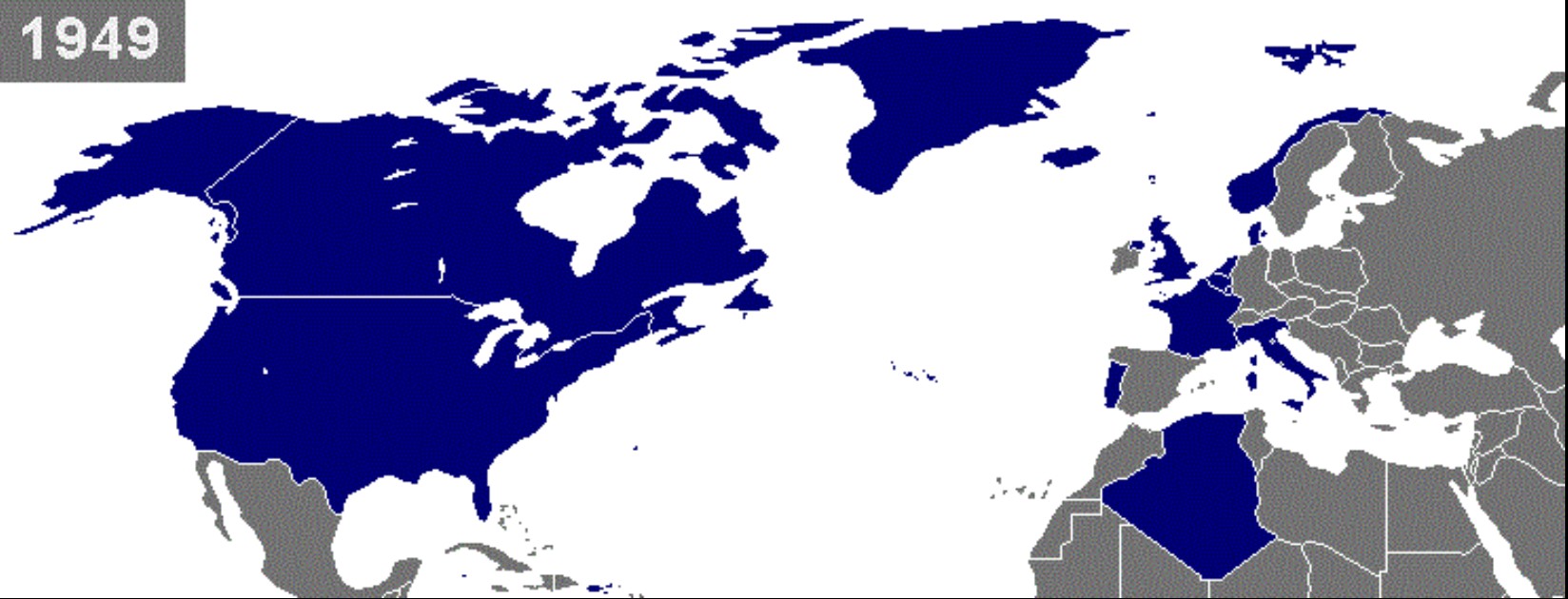
The 12 member countries of NATO at its founding in 1949 were Belgium,
Canada, Denmark, France, Iceland, Italy, Luxembourg, the Netherlands,
Norway, Portugal, the UK and the U.S. Also shown in the map is Algeria,
then a French colony, that later gained its independence in 1962 and
since then has not been part of NATO.

The 50 members of the United Nations at its founding in 1945.
The State Department also refers to Article 51 of the
UN
Charter, which deals with the "inalienable right to individual or
collective self-defense if an armed attack is made on a member of
the Organization" and the Security Council is not able to take
the necessary steps to maintain international peace.
The necessity of such an article in the UN Charter is
perfectly evident. But on the other hand it is just as evident
that the formation of the North Atlantic grouping can in no way
find justification in Article 51.
This is evident above all from the fact that neither
the
United States of America nor Great Britain nor the other
countries of the North Atlantic are threatened by any armed
attack. From this alone any references to Article 51 in order to
justify the formation of the North Atlantic Alliance are
absolutely unfounded.
The North Atlantic group is by no means being formed
for
self-defense or in general for those tasks with which the article
of the Charter in question deals. The North Atlantic Alliance,
headed by the United States, would simply be unnecessary to
anyone, if the desire for the violent establishment of the
domination of the United States and Great Britain over other
countries did not exist, if the desire for the establishment by
violence of Anglo-American world domination did not exist. The
North Atlantic Pact is in no way necessary for self-defense, but
is necessary to implement a policy of aggression and to implement
the policy of unleashing a further war.
From this it follows that the attempts of the State
Department to justify the formation of the North Atlantic
Alliance by Article 51 of the Charter have no foundation, that
these references can only mislead wide circles of the public, but
they cannot, serve as a real explanation of the reasons for the
formation of the new "North Atlantic" group or of any kind of
subsidiary alliances and blocs attached to it.
This is the position with regard to the State
Department's
references to Articles 51 and 52 of the UN Charter.
If the irrelevance of the State Department's references
to
the UN Charter is recognized, attention must be paid to the
other explanation of the motives for the formation of the North
Atlantic Alliance, which is also contained in this document. In
this connection the State Department's references to the
so-called Vandenberg resolution adopted by the American Senate
merit special attention.
In reality, in the Summer of last year the U.S. Senate
approved the resolution moved by Vandenberg concerning the "new
trend" of American foreign policy. The State Department's
document says that this "resolution proposes that for the first
time in the history of the country, the United States should
combine in peace time with countries beyond the limits of the
Western Hemisphere, by concluding with them an agreement on
collective security aimed at ensuring peace and strengthening our
own security."
This statement by the State Department once again
refutes its
own assertion concerning the regional character of the North
Atlantic group. Moreover, it shows that since the end of the
second world war such alterations have taken place in the
foreign-policy of the ruling circles of the USA as reveal the
frankly aggressive present character of this policy.
This resolution unties the hands of the U.S.
Government for
the formation of any international alliances in peace time, and
under the pretext of ensuring security permits the ruling circles
of the USA to enter any group and to begin any adventure, a
fact which fully accords with the present aggressive mood of the
ruling circles of the United States.
The adoption of this resolution by the American Senate
means
that the ruling circles of the USA have not only broken their
main obligations with regard to the UN but have also changed
over to a new course in their foreign policy, which henceforth is
aimed at the establishment by violence of Anglo-American world
domination. From this it follows that the resolution adopted by
the American Senate means that the ruling circles of the USA
have advocated the policy of aggression, a policy of unleashing a
further war.
With such a new formulation of the foreign policy of
the USA and Great Britain it should not be surprising that this
policy has its spearhead directed against the Soviet Union and
the countries of popular democracy. Since the Soviet Union and
the countries of popular democracy consistently defend the cause
of universal peace and are waging an unfailing struggle against
all and any instigators of a new war; we cannot expect a
benevolent attitude toward our country from those foreign circles
which are the inspirers of new aggression and which at present
are devoting their energies to the preparation of a further
war.
The Soviet Union has important agreements with the
United
States and Great Britain concerning the questions of a joint
policy both toward Germany in the West and toward Japan in the
East, which should serve as a good foundation for the
establishment of a firm and universal peace on democratic
principles. These agreements are now being trampled underfoot at
every step by the ruling circles of the USA and Great Britain,
since these circles are now adhering to a new course in their
foreign policy and do not desire to take into consideration the
agreements signed by them. Violating the spirit and the meaning
of previous agreements, the ruling circles of the USA and
Great Britain are now forming the so-called "North Atlantic
Alliance" not only without the participation of the USSR, but
also with the direct aim of using this group against the USSR
and the countries of popular democracy.
The Soviet Union also has 20-year treaties of
friendship and
mutual aid with Great Britain and France, which are entirely in
accordance with the interests of universal lasting peace and are
particularly important for consolidating peace in Europe.
However, the ruling circles of Great Britain and France openly
scorn these treaties and ignore the obligations of Great Britain
and France, which the treaties contain, to maintain and
strengthen peace in Europe jointly with the Soviet Union. It is
well known that the Governments of Great Britain and France are
taking part in the formation of the North Atlantic group and,
moreover, on the pretext of strengthening their security, have
formed the so-called "Western Union" not only without the
participation of the USSR but also with the direct purpose
of using the new West European group against the Soviet
Union.
The United States, Great Britain and France, together
with
the Soviet Union, were the principal countries which prepared the
establishment of the UN. Together with the other United Nations,
it was unanimously recognized that these four states and China
should strive for unanimity and cooperation within the UN, and
therefore the unanimity principle for the five great powers in
deciding the fundamental questions of peace and international
security was made the basis of the UN Charter. Almost the day
after the establishment of the UN the undermining of this
organization was begun.
Although this was done by other hands, everyone saw and
everyone knew that the ruling circles of the USA and Great
Britain were directing this subversive work.
How is this to be explained?
This is explained by the fact that as soon as the
second
world
war ended, the ruling circles of the USA and Great Britain
became so conceited as to think that the leading part in the UN
should belong to them themselves, and not to all the five great
powers jointly. Since the Soviet Union has demanded and is
demanding strict implementation of what is stated in the UN
Charter concerning the necessity for concerted action by all the
five great powers, since only such agreed action can in reality
ensure the interests of universal peace and international
security, the ruling circles of the USA and Great Britain have
intensified their attacks on the USSR and have developed
still further their intensive work in undermining the UN.
All this was insufficient.
Since the Soviet Union and a whole list of other states
did
not agree to alteration of the UN Charter, the ruling circles
of the USA and Great Britain evidently came to the conclusion
that they would not succeed in completely adapting the UN to
their aggressive policy, although they have not stopped striving
to achieve this. The UN Charter was inconvenient to them, and
they have achieved nothing by their attacks on the USSR for
its defense of those principles on the basis of which the UN
was established, since they have been unable in any way to shake
the position of the Soviet Government, which defends the sacred
cause of strengthening universal lasting peace and consistently
exposes all and any aggressors and instigators of war.
Convinced of this, the ruling circles of the USA and
Great
Britain evidently have drawn the conclusion that they need to
bypass the UN. The implementation of this policy also led to the
formation of the North Atlantic Alliance and also of the other
groupings of powers which have been formed and are being formed in
secret ways behind the back of the UN.
Thus we have every ground for asserting that the North
Atlantic Alliance is undermining the UN. It is impossible not to
take into account that this fact expresses the inexorable desire
of the ruling circles of the USA and Great Britain for the
final undermining and ruin of the UN, which somehow or other
still restrains and hinders the complete adaptation of other
states to their aggressive policy and which cannot become a
silent weapon in the hands of the Anglo-American bloc in
implementing a policy of establishing Anglo-American world
domination by force.
After all this it is understandable why the ruling
circles of
the USA, Great Britain and France, in following their policy
of aggression and preparation for a further war, are now striving
everywhere to pursue a policy of isolating the USSR, although
this policy is a crude violation of the obligations they have
undertaken.
Consequently, the so-called "new trend" in the foreign
policy
of the ruling circles of these states consists of the fact that
they have returned to the old anti-Soviet course of the foreign
policy built upon carrying out the isolation of the USSR -- the
policy they followed in the years preceding the second world war,
a policy which almost brought European civilization to
catastrophe.
Carried away by their aggressive plans for world
domination,
the ruling circles of the USA and Great Britain have not
understood the fact that the so-called "new trend" of their
policy, which runs counter to their recent obligations to the USSR and
the other United Nations, not only cannot contribute
to strengthening their political and economic position, but also
will be condemned by all peace-loving peoples, will be condemned
by all protagonists of strengthening universal peace, who
comprise the overwhelming majority in all countries.
The Basic Conclusions. The First Conclusion
The
Soviet Union is compelled to take into consideration the fact
that the ruling circles of the United States and Great Britain
have gone over to a frankly aggressive political course, the
ultimate aim of which is forcible establishment of Anglo-American
world domination; the policy they follow -- a policy of
aggression,
a policy of unleashing a new war -- accords with this aim.
In view of such a situation, the Soviet Union must wage
still
more energetically and still more consistently the struggle
against all and every instigator of war, against the policy of
aggression and unleashing a new war, and for a universal, firm
and democratic peace.
In this struggle to strengthen universal peace and
international security, the Soviet Union considers as its allies
all the other peace-loving states and all those innumerable
protagonists of a universal democratic peace who are the real
spokesmen of the feelings and thoughts of the peoples who bore on
their shoulders the incredible burdens of the last world war and
who are justifiably rejecting all and every aggressor and
instigator of war.
The Second Conclusion
Everyone sees that at the
present time the UN is being undermined, because it hinders and
restrains the aggressive circles, even though only to some
extent, in their policy of aggression and of unleashing a further
war.
In view of this situation, the Soviet Union must fight
still
harder and still more insistently against the undermining and
destruction of the UN by aggressive elements and their
accomplices; it must strive to prevent the UN from indulging
such elements, as frequently happens now, and strive to make it
value its authority more highly when the question is one of
rebuffing those who follow a policy of aggression and of
unleashing a new war.

(To access articles individually
click on
the black headline.)
PREVIOUS
ISSUES | HOME
Website: www.cpcml.ca
Email: editor@cpcml.ca
|
















